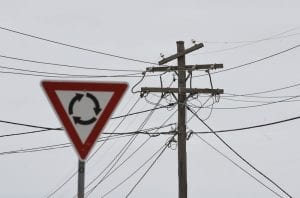The Australian economy risks being destabilised both by the direct impact of climate change and by its secondary effects, such as a slump in demand for coal and other carbon-intensive products, a new report has warned.
The report – Australia’s Financial System and Climate Risk – was released by the Climate Institute on Monday, just as reports emerged that the Abbott government would not release its post-2020 carbon emissions targets until next month.

The Coalition confirmed on Monday that it would not be publicising Australia’s new longer-term emissions target – despite increasing international pressure ahead of the December climate conference in Paris – until the party room had cleared the policy in August.
The delay is just the latest in a long line of Abbott government climate and renewable energy policy obfuscation, that is looking increasingly isolated and reckless compared to other countries’ and in light of reports like that from the Climate Institute.
As TCI’s report notes, the risks of delayed climate action are already well publicised and have been recognised by a broad range of Australian business and civil society groups.
“The IEA estimates that about $300 billion worth of fossil fuel production assets will be ‘stranded’ if emissions are sufficiently constrained to limit climate change below 2°C, but by its own reckoning, those estimates are likely very conservative,” it says.

These risks are particularly relevant to Australia’s financial systems, according to the report, through its broader economy, superannuation funds, mortgages, as well as its place in global capital markets.
It notes a trend over the past two years highlighted by unexpected market shifts, including a slump in the value of pure-play coal company shares; declining resources demand from China; and plummeting costs of solar panels.
“Australia’s economy is highly exposed to demand for its main export commodities. These demand patterns have had significant implications for Australian monetary policy in the past decade,” the report says.
“More recently, prices for some commodities have fallen sooner and more dramatically than anticipated. These falls have, in turn, put downward pressure on the Australian dollar, as the RBA has acknowledged.
“There is evidence that Australia is already suffering from the imposition of rules relating to pollution as global seaborne coal prices have
fallen. Wood Mackenzie, whose forecasts are widely used in the energy and mining industries, in January 2015 noted that tighter environmental regulations were already limiting industrial coal-burn, and the development of such regulations would continue to ‘increase pressure on coal use’.”
The report also points to the fact that two-thirds of Australian bank assets are tied up in residential property mortgages – most of those being coastal dwellings, which are the most vulnerable to sea-level rise scientists have predicted could accompany dangerous climate change.
The report says many Australian properties are underinsured, particularly those considered to be vulnerable to rising seas and extreme weather events – also linked to climate change – and banks have “limited visibility” of their exposure due to the lack of property insurance verification beyond the first year of a mortgage.
This is despite a change among investors – particularly large, long-term investors – which sees them increasingly incorporating climate risk as a material factor in their strategies, says the report.
“With major economies like the US and China putting forward initial long-term emissions reduction targets and accelerating climate action ahead of the Paris climate talks at the end of this year, the direction of travel is clear,” said TCI CEO John Connor.
“Nations and mainstream economic institutions and organisations now recognise that the global economy must be zero carbon before the end of this century.
“There’s a risk that poor policy signalling, delayed action, and mis-reading by markets could lead to a messy transition that threatens the stability of (Australia’s) financial system. This risk deserves closer examination by our policy makers and financial regulators,” Connor said.
“The question is whether the entire financial system can adapt in an orderly way to climate change and related shifts in policy, society and technology.”
What we know already, adds Connor, is that climate impacts are already costing us, and those costs will continue to grow.
“These are complex issues; it will take time and effort to work through them. This is why it’s essential to begin looking at them now.”







